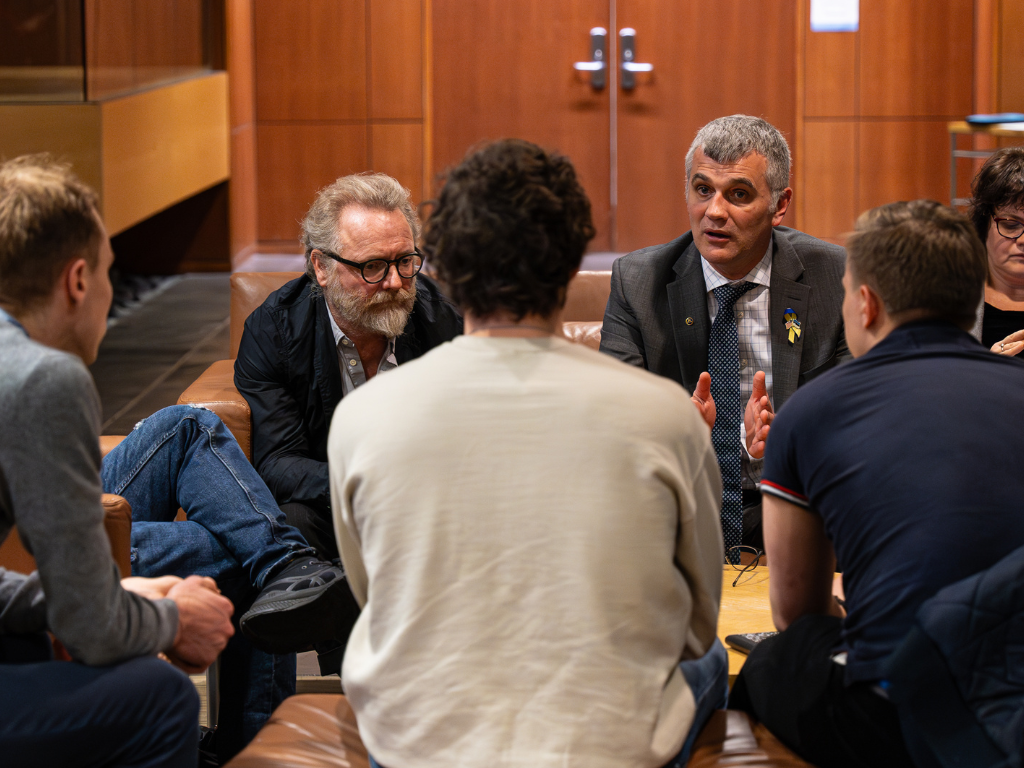At the Forefront: Ambassador Prikk explains Estonia’s response to Russia’s war in Ukraine
February 8, 2024UNC Global Affairs
 Estonian Ambassador Kristjan Prikk sits with UNC Professor Graeme Robertson and UNC students following the Diplomatic Discussion. (Photo by Walker Winslow Stephenson)
Estonian Ambassador Kristjan Prikk sits with UNC Professor Graeme Robertson and UNC students following the Diplomatic Discussion. (Photo by Walker Winslow Stephenson)
Aggression as a tool of statecraft cannot be rewarded in the 21st century, Kristjan Prikk, the ambassador to the United States from the Republic of Estonia, said during a Diplomatic Discussion on Thursday, Jan. 25 in Mandela Auditorium.
“This is not just about Ukraine,” Prikk said. “We know that this is about whether the next aggressions will even happen, or whether the message to current and would-be aggressors is, ‘Don’t you even think about it.’”

Prikk’s speech was the first Diplomatic Discussion of the spring semester. It was co-hosted by the Center for Slavic, Eurasian and East European Studies and co-sponsored by the Center for European Studies.
When introducing Prikk, Vice Provost for Global Affairs and Chief Global Officer Barbara Stephenson said that Estonia, which shares a border with Russia, has been at the forefront of the worldwide effort to support Ukraine. “Estonia, per capita, is the world’s leading contributor of military aid to Ukraine, and it’s the third highest recipient of Ukrainian refugees,” she said.
Prikk detailed the long history of Estonia, which considers itself part of the political and cultural West, dating back to the 13th century. Estonia achieved independence in 1918, after fighting a war of independence with Russia. In 1920, Russia signed a treaty promising to recognize Estonia’s independence in perpetuity. “But unfortunately… perpetuity ran out in 20 years,” he said. The Soviet Union annexed Estonia in 1940 and occupied it until the Soviet Union collapsed in 1991. Importantly, Prikk said, the U.S. and other allies never recognized Russia’s annexation, and an Estonian embassy remained open in the U.S. throughout the Cold War.
“I thought it was really interesting to learn about Estonia, especially the ways Estonia transformed in the wake of the Soviet Union,” UNC student Eloise Herdegan, who attended Thursday’s Diplomatic Discussion, said. “It wasn’t something I knew a lot about before, but it was really interesting to hear that.”
Today, according to Prikk, Estonia ranks among the top countries in the world in positive measures of society, including access to the internet, support for the rule of law and low tolerance for corruption. Estonian people have worked hard and sacrificed much to rebuild their country’s society and economy after occupation, but its gains would not have been possible without great friends, allies and partners.
“Whenever someone starts to doubt the Western ability to be a force of good, to change the lives of people for better, to positively reform societies, please point them out to the Estonian experience,” Prikk said.

In February 2022, after years of preparation, Russia invaded Ukraine. Estonia joined the European Union and NATO in 2004. Today, it strongly supports the need for Europe to stand strong against Russia as an invading force.
“This war is about the wider European security, and by extension, it’s about the transatlantic security order,” Prikk said. He argued the consequences of Russia’s aggression extend beyond the borders of Russia and Ukraine.
“I really liked how we got to hear the perspective about the war from a country that has so directly been impacted by the war,” UNC student Grace Evans said. Evans and Herdegan are first-year students at Carolina. As students in UNC’s Russian Language Flagship Program, the Diplomatic Discussion’s topic and speaker especially appealed to them.
Prikk has served as ambassador since May 2021 after previously serving as the permanent secretary of the Estonian Ministry of Defense. He has also held roles with the Ministry of Foreign Affairs working on NATO issues, the Estonian Government Office, the Estonian Embassy in Washington, D.C. and the International Cooperation Department in Tallinn.
“[Attending Diplomatic Discussions] is critical to simply widen one’s own worldview,” UNC student Daniel Nafatyuk said. “It’s a connection on a global level. This is a foreign diplomat, and it’s a perspective you really can’t get anywhere else. Where else would you see the ambassador of Estonia answer one’s questions?”
